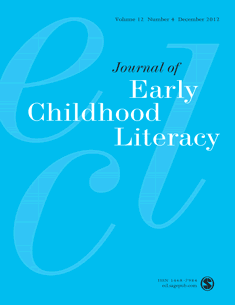
Journal of Early Childhood Literacy
Scope & Guideline
Exploring Innovations in Early Literacy Education
Introduction
Aims and Scopes
- Multilingual and Multicultural Literacy Practices:
The journal prioritizes research on literacy practices that encompass multiple languages and cultural contexts, examining how these factors influence literacy development in early childhood. - Translanguaging and Language Pedagogy:
A significant focus is placed on translanguaging as a pedagogical approach, exploring how educators can leverage children's full linguistic repertoires to enhance literacy learning. - Social and Emotional Learning in Literacy Education:
It addresses the role of social-emotional learning in literacy practices, highlighting how emotional engagement during literacy activities can support holistic development. - Innovative Literacy Instructional Strategies:
The journal features studies on effective instructional strategies, including the use of digital media, interactive reading practices, and culturally relevant teaching methods. - Research on Literacy Development in Diverse Contexts:
Research contributions often examine literacy development in various settings, including homes, schools, and community spaces, focusing on the interactions that facilitate learning.
Trending and Emerging
- Translanguaging as a Core Educational Practice:
Research on translanguaging is increasing, reflecting its growing recognition as a vital practice in multilingual classrooms that supports children's literacy development. - Impact of Digital Literacy Practices:
There is a rising trend in exploring digital literacy practices, including how digital tools and resources can enhance literacy engagement and learning outcomes for young children. - Culturally Responsive and Sustaining Pedagogies:
An emerging focus on culturally responsive and sustaining pedagogies is evident, emphasizing the importance of integrating children's cultural backgrounds into literacy instruction. - Family Literacy Engagement:
Research on family literacy practices is gaining traction, exploring how familial involvement in literacy activities impacts children's learning and development. - Social Justice and Equity in Literacy Education:
There is a growing emphasis on social justice themes, with studies addressing equity issues in literacy education and advocating for inclusive practices that support marginalized communities.
Declining or Waning
- Traditional Literacy Assessment Methods:
There is a noticeable decline in research focused on conventional literacy assessment methods, as the journal increasingly emphasizes dynamic, formative assessments that consider children's diverse linguistic backgrounds. - Monolingual Literacy Practices:
Research centered on monolingual literacy practices is waning, as the journal shifts towards exploring multilingual and translanguaging approaches that reflect contemporary educational needs. - Standardized Literacy Programs:
The focus on standardized literacy programs has decreased, with a growing preference for studies that advocate for culturally sustaining and responsive literacy pedagogies. - Static Literacy Materials:
There is a reduction in studies discussing static literacy materials, as the emphasis moves towards interactive, multimodal resources that engage children in diverse literacy experiences. - Teacher-Centric Literacy Instruction:
Research that centers solely on teacher-directed literacy instruction is becoming less common, as the journal promotes collaborative and child-centered approaches.
Similar Journals
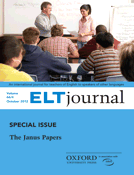
ELT Journal
Exploring Innovations in English Language TeachingELT Journal, published by Oxford University Press, is a premier academic journal dedicated to the fields of Educational Psychology, Linguistics, and Language, boasting an esteemed Q1 category ranking across these disciplines. Since its inception in 1946, the journal has served as a vital platform for researchers and educators, offering insights into English Language Teaching (ELT) and the evolving pedagogical practices that influence language acquisition and literacy development. With an impressive Scopus ranking placing it in the 95th percentile within the Arts and Humanities (Linguistics and Language), ELT Journal not only contributes to academic discourse but also bridges theoretical frameworks with practical applications in educational settings. Although it does not currently offer Open Access, the journal remains essential for professionals and students alike, eager to stay abreast of the latest research trends and innovations in the global ELT landscape. For those committed to advancing their understanding of language education, the journal's diverse range of articles and case studies provide invaluable resources.
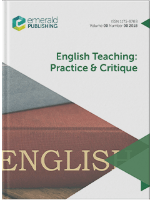
English Teaching-Practice and Critique
Advancing English Language Education Through Innovative ResearchEnglish Teaching-Practice and Critique is an esteemed journal published by Emerald Group Publishing Ltd, focusing on the interdisciplinary fields of Education and Linguistics. With a commitment to advancing knowledge and practice in English language teaching, the journal offers a platform for innovative research, critical reflections, and practical insights that are vital for educators, researchers, and students alike. The journal has established itself in the academic community, achieving a Q3 ranking in Education and a prestigious Q1 ranking in Linguistics and Language as of 2023, highlighting its impact and relevance. Although not an open-access journal, its curated content remains accessible to a global audience, facilitating meaningful discourse and development in English language education. The journal spans articles from 2008 to 2014 and 2016 to 2024, making it a valuable resource for ongoing scholarly dialogue and pedagogical advancement. It is particularly recognized within Scopus rankings, standing at the 76th percentile in Arts and Humanities as well as the 74th percentile in Social Sciences, underscoring its significance and standing in these domains.
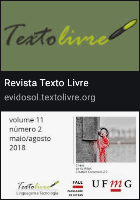
Texto Livre-Linguagem e Tecnologia
Exploring the Intersections of Language, Technology, and Communication.Texto Livre-Linguagem e Tecnologia is a prominent academic journal published by the Federal University of Minas Gerais, Faculty of Letters, specializing in the interdisciplinary domains of language, technology, and communication. Since its establishment, the journal has embraced an Open Access model, fostering unrestricted dissemination of research findings. With an ISSN of 1983-3652, it aims to bridge theoretical insights and practical applications in linguistics and technology, thereby enriching scholarly dialogues worldwide. The journal's recent classifications in the 2023 Category Quartiles highlight its relevance, achieving Q3 in Communication, Q4 in Computer Science Applications, and Q2 in Linguistics and Language. Additionally, it has earned respectable Scopus rankings, placing it within the 71st percentile for Language and Linguistics in the Arts and Humanities. This positions Texto Livre as a vital resource for researchers, professionals, and students keen on exploring the dynamic interplay between language and technology. By engaging with cutting-edge research, contributors and readers alike can shape the future discourse in these critical fields.
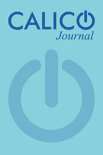
CALICO Journal
Pioneering Research for a New Era of Language Learning.CALICO Journal, published by EQUINOX PUBLISHING LTD, stands at the forefront of research in the intersection of technology and language education. With a prestigious history that spans from 1983 to 2024, this journal has been pivotal in advancing the field, earning high rankings in multiple categories, including Q1 in Education and Linguistics and Language, as well as Q2 in Computer Science Applications. Researchers and educators alike benefit from its wealth of articles that delve into innovative pedagogical strategies, the application of technology in language learning, and the exploration of linguistic theories. Although the journal is not currently open access, its impactful contributions are widely recognized, as evidenced by its strong Scopus rankings, placing it in the 88th percentile for Language and Linguistics. CALICO Journal remains an essential resource for those looking to enhance their practice and expand their knowledge in the dynamic fields of language learning and technology integration.
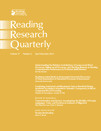
READING RESEARCH QUARTERLY
Unveiling the science of reading for all.READING RESEARCH QUARTERLY is a premier academic journal dedicated to advancing the understanding of reading research within the domains of educational psychology and literacy development. Published by Wiley, this journal has been a vital resource for researchers, educators, and practitioners, featuring empirical studies, theoretical papers, and comprehensive reviews since its inception. With a remarkable impact factor and consistently ranked in the Q1 quartile for both Developmental and Educational Psychology and Education, it stands out as an authoritative source in the field. Notably, it possesses a strong international presence, evidenced by its Scopus rankings, sitting in the top 3% for educational social sciences and within the top 5% for developmental psychology. Although currently not offering Open Access, the journal ensures that its contributions are accessible through institutional subscriptions. By linking theoretical frameworks with practical applications, READING RESEARCH QUARTERLY serves as an essential platform for fostering innovation and collaboration among scholars and practitioners aiming to enhance literacy education and understanding.

TESL Canada Journal
Fostering Excellence in Language Education ResearchTESL Canada Journal, published by TESL Canada, serves as a vital resource for researchers, educators, and practitioners in the field of English as a Second Language (ESL) and applied linguistics. With its commitment to advancing scholarship and best practices in language education, this esteemed journal fosters a platform for the dissemination of high-quality research and innovative pedagogical approaches. Although it operates without open access, its comprehensive articles and reviews offer valuable insights into current trends and challenges faced by ESL educators across Canada and internationally. The journal is dedicated to promoting a deeper understanding of language acquisition processes and instructional methodologies, contributing significantly to the professional development of its readership. Located in Burnaby, Canada, the journal aims to bridge the gap between theory and practice, making it an indispensable source for educators and researchers looking to enhance their expertise in ESL education.
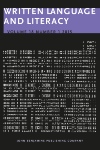
Written Language and Literacy
Bridging Theory and Practice in Written Language ResearchWritten Language and Literacy is a leading academic journal that has been at the forefront of language and literacy research since its inception in 1998. Published by John Benjamins Publishing Co in the Netherlands, this journal provides a platform for innovative and rigorous studies exploring the intersections of language, literacy, and cognitive processes. With an impressive impact factor and classified in the Q2 category for Linguistics and Language, it offers valuable insights and methodologies that contribute significantly to the field. The journal ranks 498th out of 1088 in Arts and Humanities and 577th out of 1167 in Social Sciences, placing it firmly within the academic conversation on language studies. Though it does not offer open access, it remains highly sought after by researchers, professionals, and students, ensuring a rich collection of knowledge essential for advancing literacy and language practices in diverse contexts.

Language and Literacy
Exploring the Nexus of Language Acquisition and Literacy DevelopmentLanguage and Literacy is an esteemed journal published by LANGUAGE & LITERACY RESEARCHERS CANADA, focusing on the vital intersections of language acquisition and literacy development. With a commitment to open access since 1999, this journal provides a platform for researchers and practitioners to share innovative findings and pedagogical insights that enhance the understanding of language and literacy in various educational contexts. The journal aims to foster a dialogue among educators, researchers, and policy makers by disseminating high-quality research and facilitating discussions on best practices. Recognized for its contributions to the field, Language and Literacy serves as an indispensable resource for those dedicated to improving literacy outcomes and language education globally. Based in Victoria, BC, Canada, it invites submissions that explore theoretical frameworks, empirical studies, and applied research, thereby enriching the academic community’s knowledge base.

Australian Journal of Language and Literacy
Illuminating the pathways of language and literacy education.The Australian Journal of Language and Literacy, published by SpringerNature, is an esteemed platform for advancing research in the fields of linguistics, language, and education. With an ISSN of 1038-1562 and an E-ISSN of 1839-4728, this journal has been a crucial resource since its inception in 1997, now converging into its 2024 volume. It proudly holds a significant position within the Q2 category in Linguistics and Language and a Q3 classification in Education for 2023, reflecting its commitment to high-quality scholarly content. With impressive Scopus rankings in arts and humanities and education, it engages a diverse audience of researchers, educators, and linguists. Although this journal is not open access, it remains an essential resource for those seeking to enhance their understanding of language acquisition, literacy development, and pedagogical approaches. By contributing to the discourse in these vital areas, the Australian Journal of Language and Literacy plays a pivotal role in shaping the educational landscape in Australia and beyond.

Mathematics Enthusiast
Empowering minds through cutting-edge mathematics.The Mathematics Enthusiast is a premier open-access journal published by the University of Montana, Department of Mathematical Sciences, dedicated to advancing the field of mathematics through a diverse array of scholarly articles. With its ISSN 1551-3440 and established presence since 2013, the journal aims to foster a collaborative environment for researchers, educators, and students alike by showcasing innovative research and contemporary discussions in the realm of mathematics. As a recognized entity within the field, it holds a category quartile ranking of Q4 in miscellaneous mathematics disciplines and is indexed in Scopus, positioned at Rank #188 out of 399, representing the growing interest and research impact in the mathematical community. The journal is committed to exploring cutting-edge topics and promoting mathematical literacy across various sectors while engaging readers with both theoretical and practical implications of mathematical research. For those interested in the evolving landscape of mathematics, The Mathematics Enthusiast is an essential resource, contributing significantly to academic discourse and professional development.